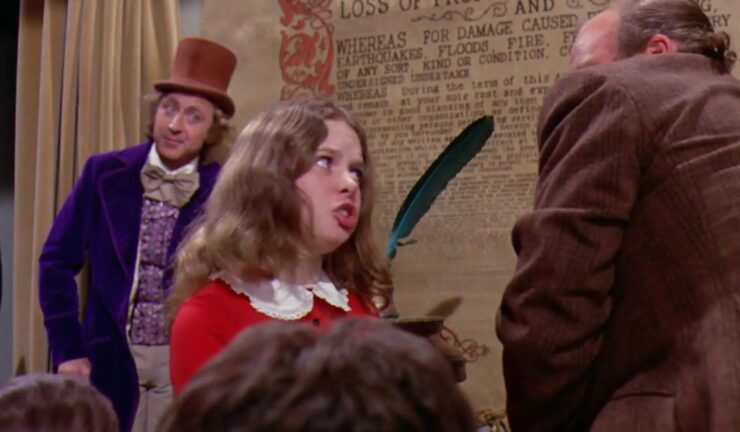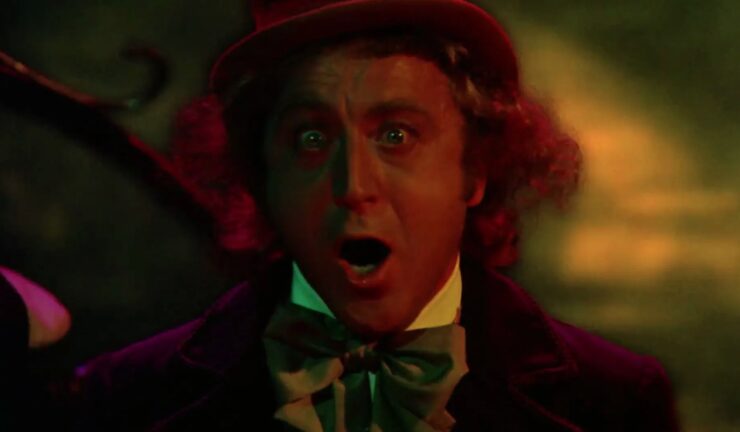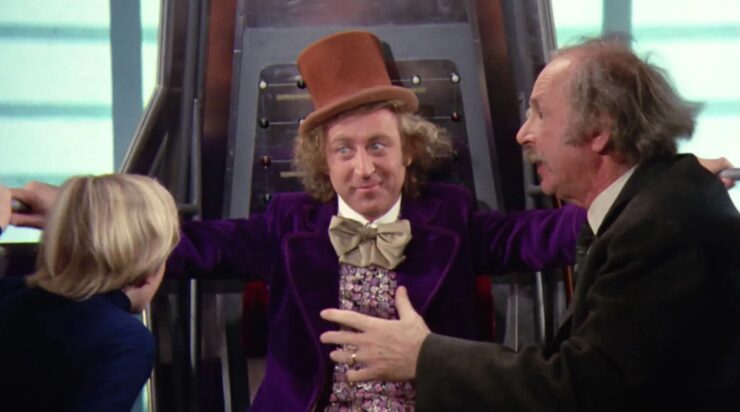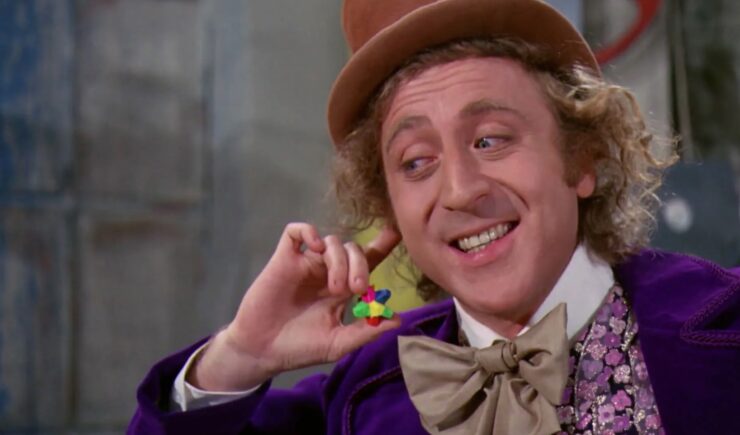Hold your breath. Make a wish. Count to three.
I have never written about Willy Wonka and the Chocolate Factory. This is perhaps not relevant by itself—it’s not as though it’s important for film critics to write about any and every movie that holds significance to them personally. But it occurred to me that there might be a subconscious factor to my silence all these years, namely: Do you want to invoke the fey all willy-nilly when you write? Does that seem like a good idea?
As is always the case when book-to-screen adaptation is invoked, there’s a fight to be had about which version of a story or character is “best,” and I’ll admit to my own waffling over the years where that question is concerned. People who love books may feel duty-bound to say that the book is best, and any adaptation that hews closest to the book is therefore the best adaptation. By this logic, Tim Burton’s Charlie and the Chocolate Factory would hold that place—an argument that I used to make because it felt like sheer sacrilege to suggest otherwise.
But then I remembered that I’m not much for the concept of sacrilege, and finally came back around to my truest opinion on the subject: 1971’s Willy Wonka and the Chocolate Factory is the best version of Roald Dahl’s story. Including the one that Dahl wrote.
My reasoning is simple as this: Willy Wonka and the Chocolate Factory is not a tale about a poor boy being secretly tested by a zany nightmare entrepreneur who hopes to find an heir to his money-making empire of very cool candy. That’s the book that Dahl wrote, certainly, and it might be the film that some people think they’re watching, but they’d still be wrong. Willy Wonka and the Chocolate Factory is a story about what happens when you willingly step into the fairy circle and engage with every single aspect of the territory beyond because you’re a child and none of your guardians were knowledgeable enough to tell you the rules. It’s about modernity coming up against things it no longer remembers or understands. It’s about the dangers of forgetting in a world that is rapidly filling up with distractions and frivolities.
It transcends its original parameters by every measure. And we got one of Gene Wilder’s most iconic performances out of it, from a man whose career is entirely made of iconic performances.
So how were we lucky enough to get this movie? While Dahl received credit for the film’s screenplay, he left early in the process due to creative differences, and his largely unfinished script was completed by David Seltzer in an uncredited rewrite. Yes, that’s the guy who went on to write The Omen and its many sequels. Which is relevant because there’s a genealogy at work here, and horror and fairy tales are never far apart on that family tree. (There were also scenes added by Robert Kaufman to add humor to the Golden Ticket frenzy.) Dahl disowned the film, thinking it sappy and sentimental—which is perhaps the strangest complaint of all because aside from a (slightly) sweeter end-point, the film doesn’t deviate from his basic plot much.
Willy Wonka and the Chocolate Factory stands tall over half-a-century after its release because it parodies the time period it was created in so completely that it renders the era into fantasy landscape: drab newsrooms with murmuring anchormen, sardonic computers who defy their inventors, grimy cop show side plots where distraught and beautiful housewives consider giving up their husbands for a case of Wonka bars, and an opening number that promises literal showers of gum drops and snappy tunes from the neighborhood candy-slinger. I was born well after the film’s release, and watching it at a remove becomes a different kind of immersive experience: You’ve stepped into a different world long before you arrive at the factory.
But once the tickets are awarded and the plot set in motion, we’re in the realm of Willy Wonka and his musical troop of Oompa-Loompas—and it all begins with an act of hypnotism. Fans of the film are likely aware that Gene Wilder wouldn’t accept the role unless he was allowed the entrance we see: Wonka limping out with a cane that he subsequently loses, before falling into a somersault and leaping up to applause. The child actors were not informed of this ploy to get genuine reactions, and Wilder wanted this moment to create a sense of distrust between the character and audience. But what’s arguably more important is that the entrance is so heightened that it’s easy to forget everything else going on. You’ve been captivated by the performance, and so you follow along.
And immediately following the hypnotism… we sign a contract.

Everyone knows you don’t sign contracts with the fey. You don’t make agreements, you pay attention to wording, and you certainly don’t give them your name in writing. And this is played off in the film as a jab at business dealings, with jokes about liability and accident clauses, but what’s more fascinating is that despite the reticence of the adults in the room, everyone ultimately agrees to the terms—and they can’t read the fine print.
In stories about the fey, humans are only as safe as their own traditions dictate. There are rules passed down from elders and community to keep their people safe: Don’t step into a ring of mushrooms. Leave a dish of cream at the door. Throw spilled salt over your shoulder. And of course, if you find yourself in fairyland, never ever eat or drink anything provided.
But Willy Wonka already has their names and the very first place he leads them to is The Chocolate Room, stacked floor to ceiling with edible landscape. He allows them to enter as he begins his next little hypnosis, in form of a song:
Come with me
And you’ll be
In a world of pure imagination…
It works on the audience even better than the tour winners. As the children and their parents gorge themselves on fairy food, Willy Wonka serenely kicks a few beach balls about and eats his teacup. All he had to do was be a little mysterious and entirely confusing, and ten people happily walked right in to his realm. The song is at once catchy and deeply affecting, the sort of tune that you come back to over and over. Songs are spells, of course.
And then, after signing their names and eating the food, it all begins to go… squiggly.
Augustus is first, sucked up from the chocolate river and propelled through a pipe. Before his mother can be taken off to find her son, we’re treated to the first Oompa-Loompa musical number. In the book, the preachy poems read as a checklist of everything Dahl finds wrong with “youths” today, and they go on endlessly to that effect. But the film gives these songs a parable structure that begins and ends the same, making the Oompa-Loompas themselves into Wonka’s own Greek chorus. There’s no emotion in their pronouncements, only observation and some acrobatics.

Next up is the river boat sequence, which manages more articulate horror than the genre often produces. And it’s relevant that this tends to be the scene that haunts people the most after viewing. All of Dahl’s complaints at the saccharine atmosphere seem comical when you consider that arguably the film’s most famous moment is Wonka humming an eerie poem that raises steadily in pitch and fury while grotesque imagery plays out on the tunnel walls and psychedelic color schemes whirl across the actor’s faces. That is what sticks in the viewer’s mind. And it sticks because it hacks at the deepest truth of the film: You should not feel safe here.
Wilder’s delivery throughout the film only speaks to this reading. Of course his comic timing can’t be matched, but he takes Wonka’s lines and delivers them as though he’s only barely interacting on this plane, and then only when he feels like it. Seltzer added a running gag that has Wonka constantly quoting from literature, which fits the schema perfectly—as though Wonka is trying to convince everyone of his incredibly human bonafides. He doesn’t understand these people, and he doesn’t much care to, but he would like them to possibly stay forever in a hell of their own making.
The children each succumb, falling like so many candy dominoes, and the fault for this does lie squarely at their parent’s feet… but not for the reasons that original story would have us believe. Each child is saddled with attributes that we associate with the modern world: mindless excess (Augustus), spotlight-seeking through obnoxious behavior (Violet), instant gratification (Veruca), and media inundation (Mike). How could any of these children be prepared for magic? The world has moved away from its protective superstitions—it only believes in capitalist might now. And Willy Wonka has a whole factory full of that.
What makes Charlie special in all of this is his kindness, certainly, but it’s also his reason for putting his name on that contract. As Grandpa Joe tells him: “Sign away, Charlie, we’ve got nothing to lose.” Charlie and his family can’t sink any further. They can’t have any less. They have no reason not to follow through and see where it leads.
And where it leads is a room full of secrets that turns Violet into a blueberry; a sneak sip of fizzy-lifting drink that almost get him and Grandpa Joe killed by the world’s most dramatic ceiling fan; a cadre of geese laying golden eggs that lead Veruca down the garbage chute; and Mike Teevee’s final performance as the world’s smallest boy sent directly to your television screens. Charlie only winds up the last kid standing because he picked the mildest form of disobedience… or perhaps because he was clear-eyed enough to avoid the fate that came with it.
Unlike the book and other adaptations, Wonka only insists verbally that the children will be fine as each one of them is hauled off in turn for their missteps; we never see any of them again, or their parents. Are we meant to take the candyman at his word? Believe that they all got home safe and sound? As we’ve been shown from his first steps on screen—he shouldn’t be trusted.

Perhaps the end is a touch sweetened because Gene Wilder is a lovable guy, even when he’s embodying otherworldly forces beyond our comprehension. But the final scenes of the film never struck me as particularly uplifting, aside from Charlie and his family being hauled out of poverty. What Wonka offers is merely the opportunity to do as he says: Charlie will inherit the factory, but only after he’s been molded in his creator’s shape. Otherwise, the secrets won’t be his.
So Willy Wonka and the Chocolate Factory is magical and joyful and wacky and a perfect family film. But that’s not the reason I come back to it over every other version of this story that exists. I come back to it because it’s much screwier than all that.
In the end, I’m reminded of the final lyric in the opening number, “The Candy Man”:
The Candy Man can
‘Cause he mixes it with love
And makes the world taste good
And the world tastes good
‘Cause the Candy Man thinks it should…
Not because we deserve a nice world, or because he cares about us. Just because he thinks it should. There’s no kindness in that thought, no benevolence. Only the power to make what you want reality.











Excellent article! It articulated that fey feeling that I could never could put into words. And I still, to this day, get goosebumps at the, “So shines a good deed in a weary world,” part.
Even at the end when we see Willy Wonka’s office, which is not part of the tour or magical candy making, it’s obvious that this could not be a regular person’s office. It makes no sense. So Wonka being fey explains it.
The joke at the beginning when the exasperated operator says “I am now telling the computer exactly what it can do with a lifetime’s supply of chocolate!” is still very funny.
For a great inside look on what it was like making the film, see I Want It Now by Julie Dawn Cole, the actress who played Veruca Salt.
This is the only correct take. It’s a cromulent book. Honestly, I haven’t seen the Burton version in full, but did catch just enough of it on hotel room cable to know it wasn’t for me. But the ’71 film is perfect for all the reasons you mentioned.
“Willy Wonka and the Chocolate Factory is a story about what happens when you willingly step into the fairy circle and engage with every single aspect of the territory beyond because you’re a child and none of your guardians were knowledgeable enough to tell you the rules.”
…you have nailed this perfectly, and I always felt this way about the book (and a fair amount of Dahl’s writing).
I was a kid when this movie first came out, and I remember being gratified that, unlike a lot of the big-budget movie musicals of children’s books at that time, it was actually more or less faithful to the source material. Where I think it succeeded more than the book was particularly in giving Charlie Bucket something of a personality. What I remember of the book was, he was just a nice, poor boy, who ends up winning everything because he keeps quiet and minds his manners – in other words, he doesn’t do anything but show up.
In the movie, he’s genuinely concerned about winning a ticket, he gets upset and frustrated when he doesn’t, and just manages to barely escape a fate as gruesome as the other winners. And he has to face serious temptation when Slugworth offers him a fortune if he steals an Everlasting Gobstopper, given his family’s poverty.
The movie also deals with the excruciatingly dated problem of the Oompa-Loompas being Africans smuggled in crates to Wonka’s factory, happily working away for chocolate, by making them into fey creatures, impossible orange-skinned, green-haired people from an imaginary land.
Willy Wonka as a wayward Fairy Prince makes so much sense that I’m surprised I haven’t heard this theory before.
He’s not a businessman, he’s a sensualist; he wants to excite the taste buds of his consumers, to bring them joy with his confections, because that’s what brings him pleasure. Unfortunately, his consumers are odd and unpredictable creatures and they need to be approached with caution and the occasional misdirection.
Wilder conveys all of this effortlessly, magnificently. This is why the Burton Wonka doesn’t work for me. Origins? Back story? Who needs it?
this sentence is exactly what I’ve long known but never understood. I always loved the story, but I loved Wilder’s & Stuart’s interpretation even more. I could never quite articulate why. you’ve captured it for me.
“And we got one of Gene Wilder’s most iconic performances…”
He really was brilliant.
And even as a kid I knew not to trust Willie Wonka. He looked waaaaay to happy every time something happened to one of the kids. Whispering, ” no, wait, stop”.
Sorry, double post
Well, the OTHER reason why Dahl likely pulled out of involvement with the Wilder movie is because there were too many Jews involved. Dahl was famously antisemitic and quite vocal about it. Seltzer, Wilder, and Kaufman’s involvements were surely not popular with the original author. Seems rather an odd omission in this article.
I want to add my voice to those @5, @8, et al. and thank you, Emmet, for putting your finger on such an insight that I’d never quite articulated for myself. [Oy. That was atrociously worded thanks to an utterly exhausting day.]
Bravo, as others have already said, you’ve put your finger on something , too, have always felt without being able to name. And it has been a major bee buzzing in my head for a long while. I’m fairly well-versed in the rules of Fairy/Faerie, Elfame, the Fae Realm, but it never occurred to me that Willy Wonka might be one of the Fair Folk. Your analysis and insight is a most welcome gift. Thanks!
“We are the music makers, and we are the dreamers of dreams.”
(Side note: The article didn’t mention that everyone ignores the basic rule of dealing with the Fae: Abide by the rules or you will regret it.)
This brilliant analysis! The fairy world keys to Wilder/Stuart’s “Wonka” were always in plain sight, but first having seen this film as a child at a special Saturday screening in 1971, the hypnotic spell it wove kept me from seeing them quite clearly all these many years on until your review. Gobsmacked!
Sorry, but I’m rerolling some of what you’ve written here into my book on AI, which is this half-century’s fairy-ring of mushrooms. Brilliant.
And thank you, Gene Wilder, in asbentia.
This was one of the films I had round my granma’s on video (along with Jason and the Argonauts, Star Wars, Gulliver’s Travels (the Fleischer Studios one) and Tom Thumb (1958)), so I’ve watched it more times than I can remember. It’s just great – I couldn’t understand why it didn’t always get a good press, and I did think it was better than the book, for once.
I’m not sure about understanding Wonka as fundamentally a Fey character. The reason is that what seems to be animating him – and Charlie – in the last analysis is a kind of absolutist morality; a morality which is happy to be masked in all the surreality and even horror of the world, but never allows that to take over. Fairie characters cannot be like that – ultimately, we cannot trust them to be so. If they acquire a conscience, they have become something else. At the end, Charlie knows he’s done something wrong, so he makes amends. The fact that his choice makes zero sense given how society has treated him is beside the point – he’s going to regret it, but that’s who he is. But Wonka happens to be one of the few people who thinks about things – at the deepest level – just like Charlie does. But I’m not moved at the end by the thought that Charlie is going to inherit the factory, but that he’s actually been rewarded for being that kind of person. But, interestingly, it’s kind of implied that Charlie couldn’t be the person he was without his family. So Granpa Joe’s insistence that Charlie will get a ticket because he wants it more than the whole rest of the world – on the face of it absurd, and even dangerous given their social position – is completely justified.
Great film
YES! Thank you for articulating this idea. I have also thought a lot about Gene Wilder’s portrayal of Willy Wonka and how otherworldly he seems–though I did not compare him to a Fey creature, but rather a god of chaos, Dionysus! When I was in college, I made my fellow Classics students watch Willy Wonka and the Chocolate Factory with me during one of our Classics Club get-togethers because I found Gene Wilder’s portrayal of Willy Wonka to be very similar to Bacchus/Dionysus. I even made a PowerPoint presentation to show everyone afterwards comparing it to Euripides’ tragedy Bacchae. I am quite tickled that you mentioned that the Oompa Loompas are a Greek chorus, because that was a slide in my PowerPoint (though I also compared them to maenads, the followers of Bacchus that hail from a distant land).
Mostly the strongest comparison is the fact that Willy Wonka and Dionysus are both seemingly mystical beings controlling the areas of food (candy/wine respectively) that can be wonderful and joyous in moderation, but can lead to madness and gluttony in excess. The boat scene also continues to be an example of chaos and madness, the underlying current of danger behind seemingly friendly yet mysterious personas. Willy Wonka will allow the children who do not respect his craft to get hurt without thought, so will Dionysus in Euripides’ Bacchae. It’s a bit of a silly comparison and it doesn’t hold up at every comparison, but I find it to be a similar thought to him being Fey. Either way, his acting in that movie brings out such a feeling of awe in me. I absolutely love how irreverent he is–his stoic and unenthused comments of “no… don’t… stop” whenever the kids go do something that will get them hurt. His random quotations and lapses into other languages. I am so drawn to his mysterious, whimsical, chaotic and mad characterization. I think about it probably more often than is normal.
Anyway. Wonderful article! And a great film.
This version has always been my favorite…where I might disagree with it *slightly* is I have always felt that in this version Charlie doesn’t have his father because Wonka comes in and takes that role. And Wonka has no business being *anyone’s* father. I think this is more demonstrated in The Great Glass Elevator, but even without that he is far too fey. Which is why I was offended by Burton giving him a back story. The fey have no back story…they simply *are*.
Thank you for such a fabulous articulation as to why this is and will remain the best version.
I needed time to consider my response, so a bit late, but so it goes.
I was utterly enchanted by this movie – saw it at age 17 when it first hit the theaters, so dating myself a bit. LOL
At the time I took it pretty much in stride. Both the scary boat ride and the casually resigned no, stop, don’t made perfect sense to me. He knew perfectly well that these people were not going to listen to rules, and would have to face consequences, and most of them clearly deserved the nightmares they brought on themselves, IMO.
There were a couple moments that hooked me at a visceral level, but with rather different reasoning than given here. The little drama at the gate with the cane was, to me, his simple way of letting them know not to underestimate him (knowing it wasn’t going to help), and the swish of the cane on the steps, to keep them from barreling down was likewise his way of showing there were rules, and he expected them to respect them (ditto). Because of my particular emotional makeup I accepted both as signs of a high intelligence who already knew not to expect respect, and so they got what they had coming.
The idea of him being fey actually fits pretty well with my original perception, since the fey usually do give fair warning before pronouncing sentence on transgressors.
I never read the book (it’s been on my TBR list forever), and have yet to see the new version with Chalamet, but I did watch the Burton version once, out of curiosity, and was less than impressed – it lacked the magic I loved from the much re-watched original.